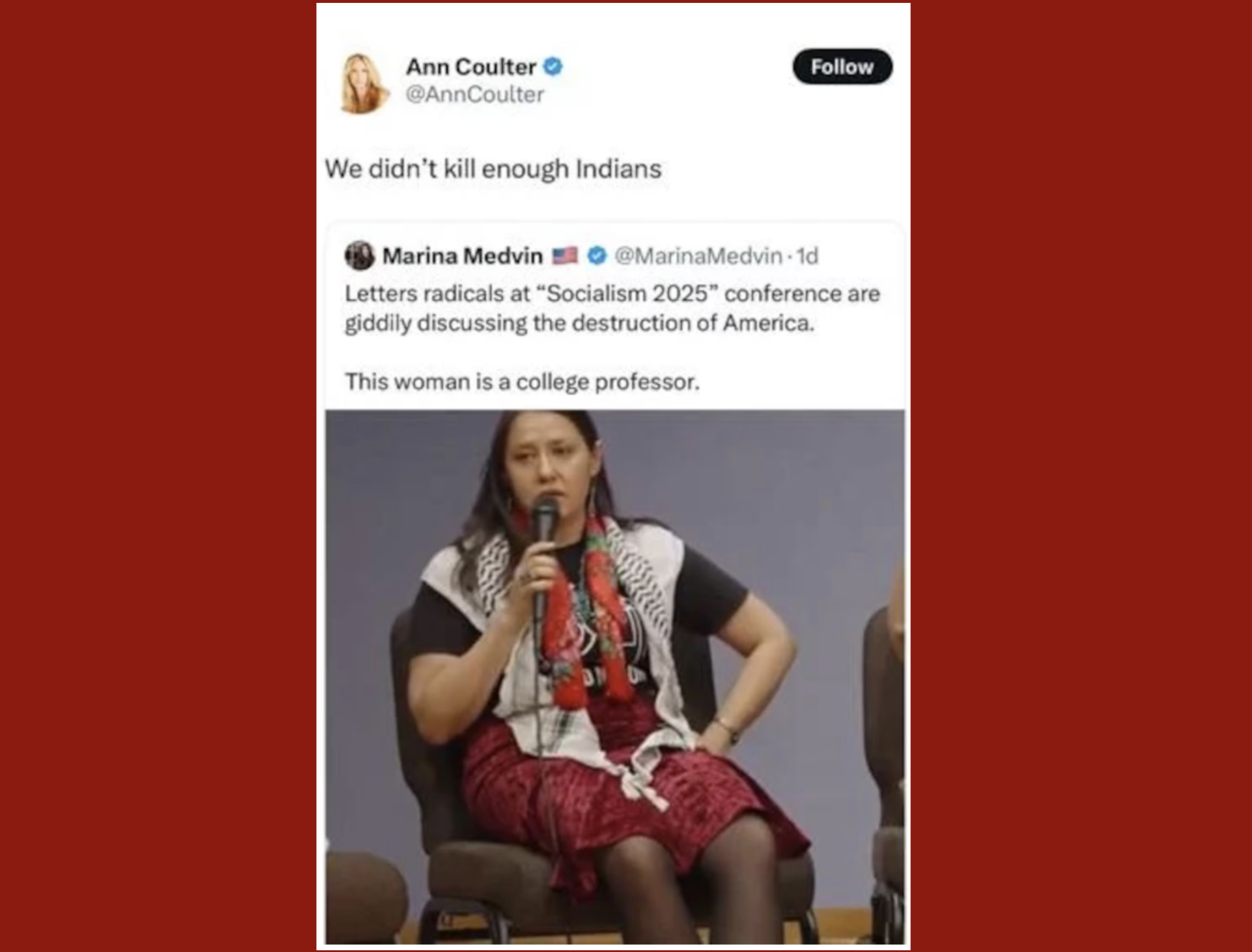
- Details
- By Levi Rickert
Opinion. Between 1492 and 1900, millions of Indigenous people across Turtle Island—a term many Native peoples use to refer to North America—died as a result of disease, violence, and forced displacement following European colonization. Scholars estimate between 4 million and 18 million Indigenous people perished during this period. By 1900, the Native American population in what is now the United States had fallen to approximately 237,000.
In 1907, President Theodore Roosevelt wrote in the foreword of Edmund S. Curtis’s book, The North American Indian: “The Indian as he has hitherto been is on the point of passing away.” This served as both encouragement and endorsement for Curtis to photograph Native Americans, based on the belief that they were a “vanishing race.”
Apparently, the millions of Indians killed were not enough for right-wing conservative pundit Ann Coulter. Earlier this week, Coulter responded to a video clip of Diné professor Melanie Yazzie advocating for tribal sovereignty by posting on X (formerly Twitter): “We didn't kill enough Indians.”
This wasn’t random hate speech. Coulter was specifically attacking tribal sovereignty and our continued existence.
Her racist post was reportedly viewed over 10 million times.
In the clip, Yazzie, who spoke at a December 3, 2023 "teach in" in Minneapolis encouraged attendees to “lean into the fact that colonizers are scared” and argued that decolonization of the United States could address environmental and other concerns. Rather than engage with the substance of Yazzie’s tribal sovereignty comments, Coulter chose genocidal rhetoric.
Coulter’s since-deleted post drew immediate backlash from Native American tribal leaders and organizations, who denounced it as a dangerous incitement to violence against Native communities.
Cherokee Nation Principal Chief Chuck Hoskin, Jr. called Coulter’s post “beyond abhorrent” and dangerous hate speech designed to inflict damage on a marginalized community.
“The country frequently seems on the verge of political violence,” Hoskin said. “Coulter’s post implicitly encourages it.”
The National Indian Health Board issued a statement calling Coulter's language “violence—violence that echoes through generations, reopens wounds, and contributes to the devastating rates of depression, suicide, and trauma that too many of our Native youth are forced to carry.”
This language isn’t just hateful rhetoric. It echoes the genocidal violence Native Americans have endured for centuries since European contact. Her post brought me back to the images of frozen bodies at the Wounded Knee massacre in 1890.
A public figure casually suggesting that more Indigenous people should have been killed isn’t protected free speech — it’s incitement cloaked in historical erasure.
Coulter's response reveals the threat that tribal sovereignty still poses to those who would prefer we had vanished entirely. Her genocidal language is a direct attack on our right to exist as sovereign nations.
Yet where is the national mainstream media calling her out? Where are the Congressional voices that should be amplifying our concerns? Threatening our right to exist as citizens of sovereign nations demands a response from our allies.
Coulter’s inflammatory rhetoric crossed a new line. It’s not just offensive — it’s genocidal speech and it must be condemned by all, regardless of political affiliation.
Native people are not props for shock value or hate clicks. We are sovereign nations. We are still here. We will continue to defend tribal sovereignty that triggered Coulter’s post in the first place.
This attack by a national figure reminds us of the racism still deeply rooted in American society. It’s exactly why Native voices, resistance, and truth-telling matter more than ever.
Fortunately, for those of us who remain, Roosevelt and Curtis were wrong. Ann Couter has it wrong. Enough Indians have been killed. We are still here and we will defend our tribal sovereignty, our culture and our lives.
Thayék gde nwéndëmen - We are all related.
Editor's Note: This column has been updated to reflect the correct venue where Melanie Yazzie spoke. The clip was originally erroneously tagged as being taped at the Socialism 2025 conference.
More Stories Like This
Jesse Jackson Changed Politics for the BetterNative News Online at 15: Humble Beginnings, Unwavering Mission
From the Grassroots Up, We Are Strengthening the Cherokee Nation
Friday the 13th: When Superstition Proves More Powerful Than Law
Congress Must Impose Guardrails on Out-of-Control ICE
Help us defend tribal sovereignty.
At Native News Online, our mission is rooted in telling the stories that strengthen sovereignty and uplift Indigenous voices — not just at year’s end, but every single day.
Because of your generosity last year, we were able to keep our reporters on the ground in tribal communities, at national gatherings and in the halls of Congress — covering the issues that matter most to Indian Country: sovereignty, culture, education, health and economic opportunity.
That support sustained us through a tough year in 2025. Now, as we look to the year ahead, we need your help right now to ensure warrior journalism remains strong — reporting that defends tribal sovereignty, amplifies Native truth, and holds power accountable.
 The stakes couldn't be higher. Your support keeps Native voices heard, Native stories told and Native sovereignty defended.
The stakes couldn't be higher. Your support keeps Native voices heard, Native stories told and Native sovereignty defended.
Stand with Warrior Journalism today.
Levi Rickert (Potawatomi), Editor & Publisher

